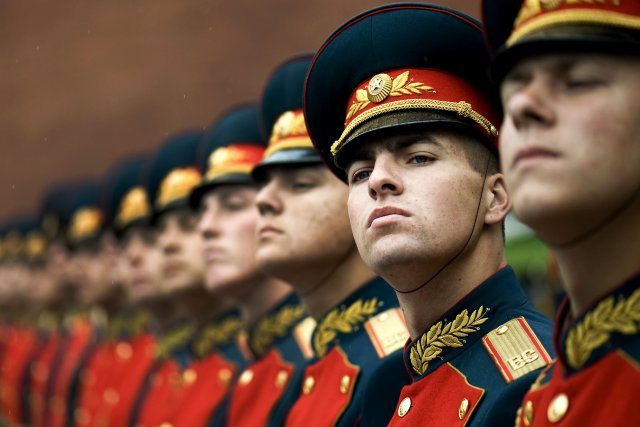Recently the Russian military has instituted a new sergeants program. This program is intended to correct a Soviet era oddity. The Soviet military, when it reduced conscripted service to two years, essentially lost any real NCOs. Sergeants were appointed after one year of service, and hardly had the experience of knowledge to effectively lead troops. Instead the USSR had a rather large number of officers, with a relatively smaller proportion of enlisted. This was further exacerbated by the cadre nature of many Soviet units. On a day to day basis junior officers fulfilled the roles that in most western armies are carried out by sergeants. When the USSR collapsed the military contracted rapidly, with even more units getting cadre status. Many cadre divisions did not have a full regiment worth of enlisted personnel, but had full complements of officers. The result was that the role of NCOs was entirely taken over by officers.
However with the introduction of contract soldiers, and the tossing around of ideas about a professional military, the question of NCOs naturally came up. Until the most recent reforms, however, NCOs remained simply second year conscripts selected by their company commanders, with the exception of small numbers of contract soldiers that served longer then draftees and were commonly appointed as sergeants. When the most recent reform started the numbers of officers were radically reduced. Not only did the number of officers in the units get reduced as a proportion to soldiers, but also cadre units were eliminated entirely. All units are now at full or near full strength, this occurred simultaneously with the reduction of draft service to one year. Consequently there was no more second year conscripts to use as sergeant material, and not nearly enough contract soldiers to fill the roles. A federal program to produce new professional sergeants took off.
This program involved using officer schools (namely the VDV RVVDKU school) to train sergeants on a new program that lasted 2 years and 10 months, during which the sergeant candidates live on base, and receive a military and civilian education, and at the end get an Associates degree and the rank of a junior sergeant. They sign a 5 year contract, and after graduating are supposed to serve another 2 years and 2 months as contract sergeants. This solution seems to be aimed at producing prestigious, authoritative, and well trained NCOs. However this also raises several important questions. First off will these sergeants come from people who have already served a year of draft service or will high school graduates be able to go straight to sergeant school without serving, similar to officer academies? Second off will these sergeants be able to effectively lead soldiers, or will they simply consist of people who can’t find decent work in the civilian world? Finally will these sergeants live in the barracks along with the junior enlisted, essentially locked inside the base, with the exception of the occasional weekend pass? Will there even be enough of them to satisfy the needs of the armed forces? Depending on how the situation is handled, and what the answers to those questions are, the new NCOs may or may not fix the problems with discipline, hazing, and combat effectiveness of the Russian military. Or they may turn out to be a too little and ineffective attempt at a band aid.
There is also the question of what to do with the contract sergeants, staff sergeants, and company NCOs, that are currently serving, many of them have served for years, and have experience of leading soldiers, and doing their job. Will they be required to go through the sergeants school to confirm their rank? Will they be phased out as they themselves retire? Or will they be summarily demoted or even retired as new NCOs become available? Meanwhile the majority of sergeants remain one year conscripts who spend one month in basic training, 5 months in accelerated sergeant courses, and the remaining 6 months as junior sergeants and sergeants. With the increasing number of training hours, and intensification of soldier training these sergeants will be better trained, but will they be able to lead?
The opinions expressed in this article are the author’s (Iouri Synogatch) and do not necessarily represent those of DefenceTalk.










